雅思口语话题必备句式
雅思口语考试万能句型
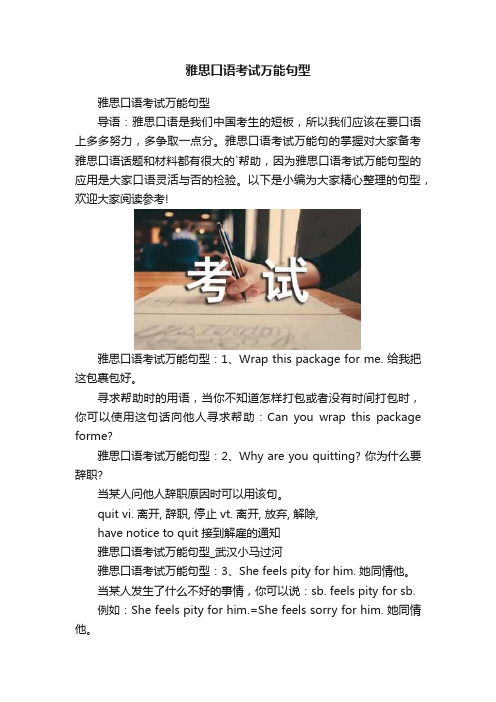
雅思口语考试万能句型雅思口语考试万能句型导语:雅思口语是我们中国考生的短板,所以我们应该在要口语上多多努力,多争取一点分。
雅思口语考试万能句的掌握对大家备考雅思口语话题和材料都有很大的`帮助,因为雅思口语考试万能句型的应用是大家口语灵活与否的检验。
以下是小编为大家精心整理的句型,欢迎大家阅读参考!雅思口语考试万能句型:1、Wrap this package for me. 给我把这包裹包好。
寻求帮助时的用语,当你不知道怎样打包或者没有时间打包时,你可以使用这句话向他人寻求帮助:Can you wrap this package forme?雅思口语考试万能句型:2、Why are you quitting? 你为什么要辞职?当某人问他人辞职原因时可以用该句。
quit vi. 离开, 辞职, 停止 vt. 离开, 放弃, 解除,have notice to quit接到解雇的通知雅思口语考试万能句型_武汉小马过河雅思口语考试万能句型:3、She feels pity for him. 她同情他。
当某人发生了什么不好的事情,你可以说:sb. feels pity for sb.例如:She feels pity for him.=She feels sorry for him. 她同情他。
雅思口语考试万能句型:4、Hurry up; the train is about to start.快快!火车就要开了。
解释:be about to do sth 中的about作形容词讲;意思是“即将[马上]做某事”这个句型在雅思口语基本句型中也是非常重要的,大家要注意。
例如:Hurry up; the film's about to start. 快点,电影要开始了。
not be about to do sth [非正式]不打算做某事例如:I've never smoked in my life and I'm not about to startnow.我从未抽过烟,现在也不打算抽。
雅思口语p2万能句
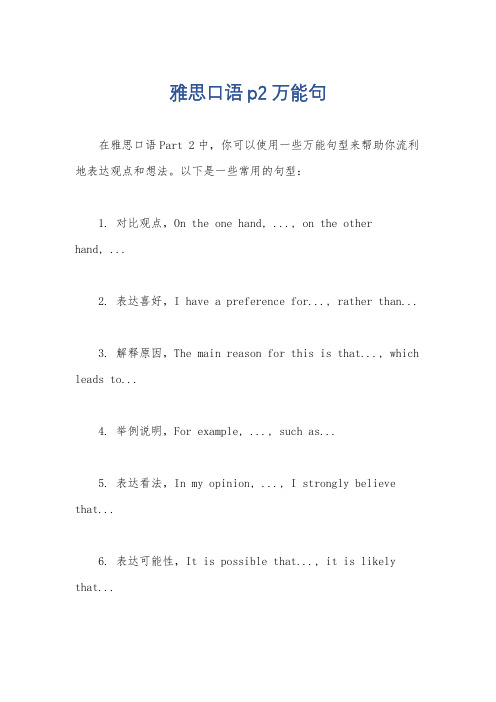
雅思口语p2万能句
在雅思口语Part 2中,你可以使用一些万能句型来帮助你流利地表达观点和想法。
以下是一些常用的句型:
1. 对比观点,On the one hand, ..., on the other
hand, ...
2. 表达喜好,I have a preference for..., rather than...
3. 解释原因,The main reason for this is that..., which leads to...
4. 举例说明,For example, ..., such as...
5. 表达看法,In my opinion, ..., I strongly believe that...
6. 表达可能性,It is possible that..., it is likely that...
7. 表示不确定,I'm not entirely sure, but I think that...
8. 表达强调,It is crucial that..., it is essential that...
9. 表示时间顺序,Firstly, secondly, finally...
10. 表达结果,As a result, ..., consequently...
这些句型可以帮助你在Part 2中更流利地表达观点和想法,但
在使用时要根据具体题目和情境进行灵活运用。
希望对你有所帮助。
雅思 口语 必背 精简

1. What do you think are the main causes of road accidents?2. Do you know what to do in case of emergency?3. Does your name have any special meaning?4. Where were you come from?5. What kind of landscape surrounds your hometown?6. Will your life change a lot after you immigrate to ABC?7. What is the difference between Beijing and your hometown?8. What are the main places of interest in your hometown?9. What is the climate like in your hometown?10. What is the character of the people like in the region where you live?11. What are the differences in accent between the people of your hometown and Beijing?12. What is people"s favorite food in your region?13. How do you make dumplings?14. What do you do during the Spring Festival?15. Why is the Spring Festival so important to Chinese people?16. Can you describe one of the main festivals celebrated in your country?17. Tell me something about the Lantern Festival.18. Tell me something about the Qing Ming Festival.19. Tell me something about the customs of your country.20. How long have you lived in Beijing?21. What is the weather like in Beijing?22. How do you compare the climate in Beijing with that in your hometown?23. What place in Beijing do you like best? Why ?24. Which is the worst place you"ve been to China?25. Which is the best place you"ve been to China?26. What places in Beijing should a foreigner visit? Why?27. What are the major social problems in Beijing? How can they be solved?28. What is the biggest problem China faces?29. What places in Beijing should a foreigner visit? Why?30. Could you tell me something about your family?31. Have you any children?32. What is your child"s name? Does his name have a meaning?33. What does your wife/husband do?34. When did you get married?35. Describe your wedding.36. How have weddings changed in recent years?37. Are there any special customs about wedding in your region?38. Describe a traditional wedding ceremony.39. Where did you go for your honeymoon?40. Did you have to ask for permission from your parents before you got married?41. Is it acceptable for couples to live together without marrying?42. Where do you think a newly couple should live? Living with their parents or on their own?43. What responsibilities should a couple take?44. How do Chinese usually celebrate birthdays?45. Are there any traditions concerning the birth of a baby?46. What kind of parent do you intend to be?47. What do you think of One-Child Policy in China?48. Why do people in China traditionally want to have a son?49. What difficulties do Chinese farmers have concerning their old age?50. What do you think needs to be done in order to relieve the farmer"s worries?51. What hope or fears do you have for your children?52. What sort of culture do you hope your child will grow up in?53. Are you going to bring up your child differently from the way you were brought up? How?54. Do you enjoy shopping?55. Who does most of the shopping in your family?56. What are you good at cooking? What is your favorite dish?57. Who does most of cooking in your family?58. Is there *** discrimination in China?59. How do you sum up women"s conditions in China?60. What are the causes of *** discrimination?61. Should government pay certain salaries to those housewives? Why or why not?62. Would you want your wife to continue with her career or to stay at home taking care of the household after you get married?63. Have you ever wished to be one of the opposite ***? Why (why not)?64. What would you do if your next-door neighbour were noisy nearly all the time?65. Do you have a lot of friend?66. What does friendship mean to you? What kind of people do you make friend with?67. What is your major?68. How do you like your major?69. When and where did you graduate? What qualifications have you obtained?70. Do you still remember your school days?71. What impressed you most when you were at university?72. Which is the best university in your country?73. Could you sum up your own study habits in a few points?74. What do you think of the practice of setting up key schools in primary and secondary school education in China?75. Do you think the subjects you are studying today are relevant to present-day society? Why ?76. What do you think education should be? Should it be a process of learning what is useful for your future life or should it be simply learning for enjoyment? Why?77. What do you do for a living?78. What do you do in the office every day?79. Since your job seems too professional to me, could you explain it in detail?80. What are your job prospects?81. If you had the opportunity to change your job, what would you do with it?82. Do you have any ambitious?83. Will any possible future changes affect your job in any way?84. What are your spare time interests?85. How do you spend your weekends?86. What is your favorite sport? What are the rules?87. What is the most popular sport in your country?88. What are the sporting facilities like in your university/Beijing?89. What do you know about Qigong? Do you believe in Qigong?90. What do you do in your spare time?91. Do you often read newspapers? If not, why ones do you read?92. What do you think of computer?93. Do you think computer has changed our life so much?94. Do you often go to the cinema/theatre?95. What kind of films do you like best?96. Do you often watch TV? What is your favorite program?97. Do you think watching TV too much is a waste of time?98. What kind of music do you enjoy?99. Who is your favorite film star? Will you describe him/her to me?100. Do you enjoy travelling?101. Where have you been travelling to? Which place interested you most? 102. Do you smoking?103. Do you think smoking is a problem that needs special attention and has to be solved? If so, why?104. What do you know about ABC?105. What problem do you think you will have in ABC?106. How will you overcome the difficulties?107. Do you think you will be able to cope with English-demands of your intended study program in ABC?108. What difficulties do you think you’ll encounter in your studies in ABC? 109. Can you imagine what life in Britain/Canada/Australia/London, etc. would be like?110. How will you fare in Britain/Canada/Australia, etc. without your family? 111. What do you intend to study?112. Which university are you going to study at?113. Why did you choose this university?114. Where are you going to study in ABC?115. What are you plans in ABC?116. What is your research proposal all about?117. What do you hope for most from your study abroad?118. Will your study abroad help your job prospects after come back to China? 119. Should you study more theory or do more practice? Give your reasons, please. 120. What kind of differences in the cultures are you expecting between China and the ABC?121. How will your study in Britain benefit your work in China when you come back to China?122. How will your study in Britain benefit your work in China when you come back to China?123. What do you intend to do after you finish studying?124. What will be your main problem when you are study in a foreign country? 125. What problem can you foresee in the future when you come back to China? 126. Will there be any adjustment problems in your life when you come back to China? If so, what are they?127. Will you have to make any changes in your work/life when you come back to China?128. Do you think there will be a gap between your knowledge gained in China and the level of knowledge you are going to encounter on arrival? If so, what will it be? 129. What do you think of the future of China keeps an open policy?130. What do you regard as the most significant events in your country’s recent history?131. Are there any special places you want to see in Canada? What are they? 132. What do you especially want to do in Canada?133. How do you like your life in ABC University?134. What do you think of the training in the university?135. In what way do you think university training is helpful or falls short?136. What aspect of English do you find the most difficult?137. Do you find American English easier to understand than Britain English? 138. What sports are played in your country?139. Could you describe the traditional architecture of your country?140. What role dose religion play in everyday life in your country?141. What would you regard as the most significant events in your country"s recent history?142. How aware do you think people are nowadays about environmental issues? 143. Could you tell me why you chose to study at the university of ABC?144. What role dose tourism play in your country"s economy?145. How serious is unemployment in your country?146. In your opinion, what are the most serious problems associated with modern life?147. What do you think have been the most important changes in your field over the past 5 years?148. What are you going to major in ?149. Are you going to do your own cooking when you are at university?150. Some local students feel that overseas students get preferential treatment. What is your opinion?151. Do you think you will be able to cope with the English-language demands of your intended program?。
雅思口语之常用句型总结
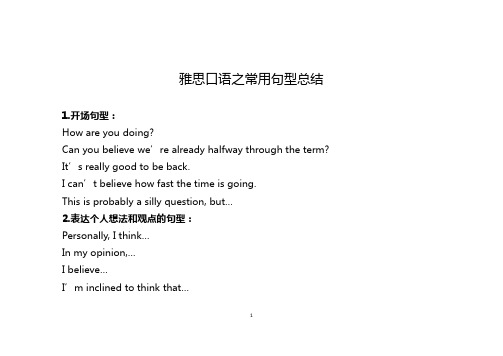
雅思口语之常用句型总结1.开场句型:How are you doing?Can you believe we’re already halfway through the term? It’s really good to be back.I can’t believe how fast the time is going.This is probably a silly question, but…2.表达个人想法和观点的句型:Personally, I think…In my opinion,…I believe…I’m inclined to think that…1Personally, I would recommend…3表达喜欢和不喜欢、喜好和偏好的句型:I really enjoy…I’m passionate about…I can’t stand…I’m not particularly fond of…I’m not particularly fond of doing…4.表达原因和理由的句型:The reason why I like/dislike…is because…One of the reasons why I enjoy…is that…One of the reasons why I find it difficult to do…is because…One of the reasons why I prefer…to…is because…5.表达经历和感受的句型:I remember when I first…It was a great experience.2The last time I…was a disaster.When I was younger, I always used to…It was a lot of fun.One of the best things about…is that you can…It makes me feel really good.6.表达建议和意见的句型:In my opinion, you should…Personally, I would recommend…If I were you, I would…I think it would be a good idea to…Personally, I would avoid doing…because…3。
雅思口语万能句式
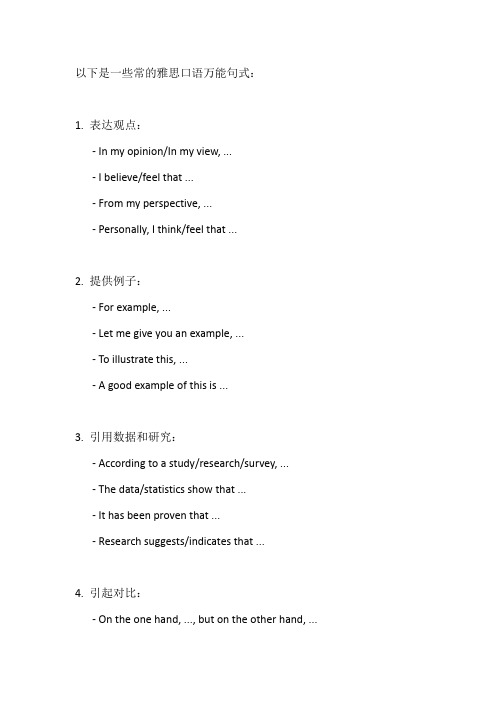
以下是一些常的雅思口语万能句式:1. 表达观点:- In my opinion/In my view, ...- I believe/feel that ...- From my perspective, ...- Personally, I think/feel that ...2. 提供例子:- For example, ...- Let me give you an example, ...- To illustrate this, ...- A good example of this is ...3. 引用数据和研究:- According to a study/research/survey, ...- The data/statistics show that ...- It has been proven that ...- Research suggests/indicates that ...4. 引起对比:- On the one hand, ..., but on the other hand, ...- While ..., on the contrary, ...- Despite ..., ..., on the contrary, ...- However, ...5. 表达原因和结果:- The reason behind this is ...- As a result/consequence, ...- That is why ...- This leads to ...6. 表达喜好和偏好:- I'm really into/keen on ...- I have a preference for ...- I'm a big fan of ...- I enjoy/like ...7. 表达同意和不同意:- I totally agree/disagree with ...- I agree to some extent, but ...- I see your point, but I think ...- I can understand where you're coming from, but ...8. 提出建议:- I would suggest/recommend that ...- It might be a good idea to ...- Have you considered ...- How about ...9. 表达看法改变:- My opinion has changed over time because ...- I used to think/feel that ..., but now I realize/understand that ...- I have come to the conclusion that ...10. 给出总结:- In conclusion/To sum up, ...- All in all, ...- Taking everything into consideration, ...- To conclude, ...记住,使用这些句式时要注意语境和适用性,灵活运用以表达自己的观点和思考。
雅思口语part2万能套话
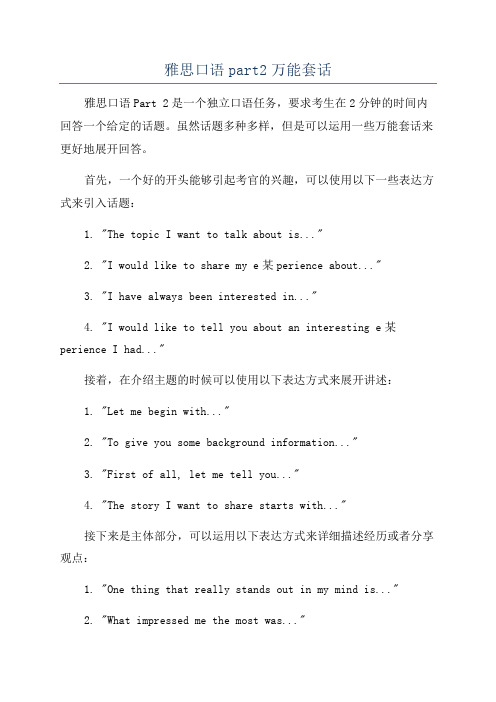
雅思口语part2万能套话雅思口语Part 2是一个独立口语任务,要求考生在2分钟的时间内回答一个给定的话题。
虽然话题多种多样,但是可以运用一些万能套话来更好地展开回答。
首先,一个好的开头能够引起考官的兴趣,可以使用以下一些表达方式来引入话题:1. "The topic I want to talk about is..."2. "I would like to share my e某perience about..."3. "I have always been interested in..."4. "I would like to tell you about an interesting e某perience I had..."接着,在介绍主题的时候可以使用以下表达方式来展开讲述:1. "Let me begin with..."2. "To give you some background information..."3. "First of all, let me tell you..."4. "The story I want to share starts with..."接下来是主体部分,可以运用以下表达方式来详细描述经历或者分享观点:1. "One thing that really stands out in my mind is..."2. "What impressed me the most was..."3. "To my surprise..."4. "What I found interesting was..."5. "From my point of view..."同时,可以使用以下一些句子连接词来过渡不同的段落或观点:1. "Furthermore..."2. "In addition..."3. "Moreover..."4. "Besides that..."5. "On top of that..."在结束时可以使用以下表达方式来总结观点或经历:1. "In conclusion..."2. "To sum up..."3. "To wrap up..."4. "All in all..."5. "In a nutshell..."最后,可以用以下一些表达方式来关闭话题或引入下一个话题:1. "That's all I have to say about..."2. "That brings me to the end of my story/e某perience..."3. "Now, let's move on to the ne某t topic..."4. "I hope you found my story/e某perience interesting..."综上所述,以上是一些可以在雅思口语Part 2中使用的万能套话。
雅思口语考试万能语句
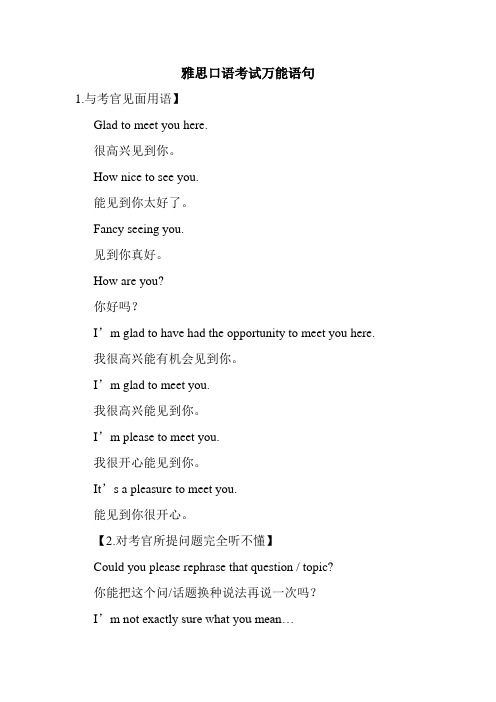
雅思口语考试万能语句1.与考官见面用语】Glad to meet you here.很高兴见到你。
How nice to see you.能见到你太好了。
Fancy seeing you.见到你真好。
How are you?你好吗?I’m glad to have had the opportunity to meet you here.我很高兴能有机会见到你。
I’m glad to meet you.我很高兴能见到你。
I’m please to meet you.我很开心能见到你。
It’s a pleasure to meet you.能见到你很开心。
【2.对考官所提问题完全听不懂】Could you please rephrase that question / topic?你能把这个问/话题换种说法再说一次吗?I’m not exactly sure what you mean…我不在确定你指的是什么。
【3.对考官所提问题似懂非懂】Do you mean…?你指的是。
If I understand right,…如果我没有理解错的话。
I’m sorry if I’m being a little slow, but…?不好意思如果我理解慢了,但是。
I’m sorry, I’m not sure I understand. Do you mean (that)…? 不好意思,我不能确定我完全理解了。
你指的是。
So am I right in saying…?所以我可以说。
If I’ve got the picture, then…如果我理解了的话,那。
So what you mean is…, right?所以你想说明的是。
对吗?Sorry I don’t quite catch you. You mean…?对不起我没完全理解,你指的是。
Can I get one thing clear?我可以确认一下吗?Would I be correct in supposing…?所以我假设。
雅思part2引入话题的句型
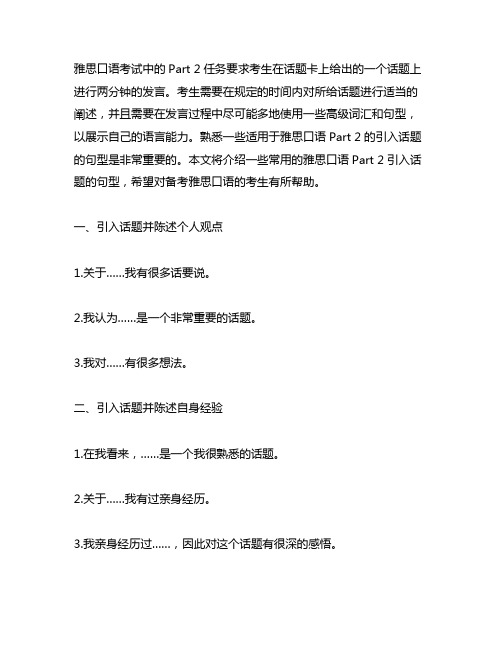
雅思口语考试中的Part 2任务要求考生在话题卡上给出的一个话题上进行两分钟的发言。
考生需要在规定的时间内对所给话题进行适当的阐述,并且需要在发言过程中尽可能多地使用一些高级词汇和句型,以展示自己的语言能力。
熟悉一些适用于雅思口语Part 2的引入话题的句型是非常重要的。
本文将介绍一些常用的雅思口语Part 2引入话题的句型,希望对备考雅思口语的考生有所帮助。
一、引入话题并陈述个人观点1.关于……我有很多话要说。
2.我认为……是一个非常重要的话题。
3.我对……有很多想法。
二、引入话题并陈述自身经验1.在我看来,……是一个我很熟悉的话题。
2.关于……我有过亲身经历。
3.我亲身经历过……,因此对这个话题有很深的感悟。
三、引入话题并进行描述1.让我来谈谈……。
2.让我来介绍一下……。
3.我接下来要讲的是有关……的事情。
四、引入话题并进行比较1.与……相比,我更喜欢……。
2.在我看来,……和……有很多相似之处。
3.在某些方面,……和……有着很大的不同。
五、引入话题并进行分析1.我认为,要从不同的角度来看待……。
2.在我看来,……不仅仅局限于……,还有其他方面需要考虑。
3.让我们来仔细分析一下……的原因。
六、引入话题并进行解释1.对于这个问题,我有一些看法和理解。
2.在我看来……,有一个很重要的原因。
3.让我来解释一下我对……的理解。
以上就是一些常用的雅思口语Part 2引入话题的句型。
考生们在准备口语考试时可以根据具体的话题内容来灵活运用这些句型,以更好地展示自己的语言能力。
希望考生们在备考雅思口语时能够取得好成绩,顺利通过口语考试。
让我们来掇述一下自己的看法和理解。
对于雅思口语Part 2的引入话题,我觉得可以根据自己的话题准备一些针对性的句型和表达,这样可以更自信地展现自己的语言能力。
在备考口语考试时,我们可以通过练习,逐渐熟悉和掌握这些句型,以应对不同的话题。
对于一些不熟悉的话题,我们可以通过积累一些常用的高级词汇和句型来扩充自己的口语表达能力。
- 1、下载文档前请自行甄别文档内容的完整性,平台不提供额外的编辑、内容补充、找答案等附加服务。
- 2、"仅部分预览"的文档,不可在线预览部分如存在完整性等问题,可反馈申请退款(可完整预览的文档不适用该条件!)。
- 3、如文档侵犯您的权益,请联系客服反馈,我们会尽快为您处理(人工客服工作时间:9:00-18:30)。
雅思口语话题必备句式雅思口语考试不是因为难度有多大而难倒众多考生,而是因为要面对考官直接交流的形式来考试,所以烤鸭们难免紧张。
但是若是备考充分,自然不必紧张害怕,本文雅思口语话题必备句式,供大家参考。
--- 话题21 机器人--- 考试必背句子Robots can helpus do some household chores in future.^将来机器人可以帮助我们干些家务杂活。
Robots have nofeelings and they only accept predesigned orders.^机器人没有感情,他们只能接受预先设置好的程序。
Robots can beused in some dangerous and poisonous working conditions.^机器人能被用在某些有毒、危险的工作场合。
Robots work moreefficiently than human beings.^机器人能比人类工作更有效率。
It is amazingthat robots can understand our orders.^机器人能懂得人类的指令真是不可思议。
If robots arewidely used, we human beings will have more time to relax.^如果机器人被广泛利用,我们人类就会有更多休闲时间。
As far as I'mconcerned,robots will be widely usedin factories in future.^就我看来,将来机器人会被广泛使用于工厂。
Robots withartificial intelligence can decide to do something by themselves.^具有人工智能的机器人能自己决定做一些事。
Some robots cando what we can't do.^有些机器人能做我们做不了的事。
In future, allthose repetitive things will be done by robots.^将来,所有重复的工作会由机器人完成。
No matter how,the robots will not take the place of our brains.^无论怎样,机器人是不会替代我们的大脑的。
The robot DEEPBLUE designed by IBM is an expert on chess.^由IBM公司设计的机器人“深蓝”是下棋的专家。
--- 话题22 收藏--- 考试必背句子Collectingstamps is my hobby.^集邮是我的爱好。
I do not collectstamps to gain money.^我集邮不是为了挣钱。
Stamp collectingis full of fun, relaxing and inexpensive.^集邮有趣、轻松且花费不大。
Some peoplecollect ancient coins by way of investment.^有些人收集古钱币作为投资。
In the processof collecting, I learn a lot of knowledge about a variety of subjects.^在收集的过程中,我学到了多种学科的许多知识。
Many people makea living from collecting and disposing items.^许多人靠收集和处理文物(东西)谋生。
As you build upa collection, it is necessary that you have skills of identifying, selecting,evaluating, classifying items.^你在收藏的过程中,你需要具有识别、选择、评估和分类等多方面的技能。
People collectalmost everything, including books, stamps, coins,fossils etc.^人们收藏几乎所有的东西,包括书籍、邮票、钱币和化石等。
Some people arekeen on collecting grotesque items such as human bones.^一些人热衷于收藏诸如人骨一类的奇异物品。
People collectthings either for fun or for money.^人们收藏物品不是出于乐趣就是为了赚钱。
I'm obsessedwith collecting pictures of TV stars.^我痴迷于搜集电视明星的照片。
Collecting canbe a gateway of understandingChina'sfolk culture.^收藏可以说是了解中国文化的途径。
--- 话题23 颜色--- 考试必背句子Many peoplebelieve different colours have different powers.^很多人认为不同的颜色有不同的作用(力量)。
Colours caninfluence our emotions, actions and how we respond to people.^颜色能够影响我们的情绪、行为以及如何与人相处(反应)。
Differentcolours have different symbolic meanings and different effects on people.^不同的颜色有不同的象征意义,给人不同的影响。
What colour youlike to some extent reflects what kind of person you are.^你喜欢的颜色在一定程度上反映你是哪一类的人(你的性格)。
Warm colourssuch as red and orange make people feel confident, active and happy.^暖色如红色和橘色使人感到自信、积极和快乐。
Cold colourssuch as blue and purple represent peace, meditation and calmness.^冷色如蓝色和紫色代表和平、沉思和冷静。
People who likewarm colours tend to be optimists.^喜欢暖色的人一般都是乐观主义者。
People who likecold colours are probably shy and quiet.^喜欢冷色的人一般都害羞和安静。
White symbolizespurity and cleanness.^白色代表纯洁和干净。
I would like todecorate my room in orange colour because it looks warm.^我喜欢将房间装饰为橘色,因为(这样)它看起来温暖。
InChina, red issupposed to bring good luck.^在中国,红色被认为能够帶来好运。
Red is a sign ofhappiness in Chinese Culture.^中国文化中.红色是幸福的象征。
--- 话题24 文化娱乐--- 考试必背句子Physical cultureis one kind of the human culture as a whole and also a very special kind.^总的来说,体育文化是人类所有文化中的一种,也是很特殊的一种。
Physical culturecharacterized with "Olympic Spirit" has been accepted by the peopleof the whole world.^以“奥林匹克精神”为特点的体育文化已被全世界的人们所接受。
China's culture hasnever stopped developing throughout history.^中国文化在历史上从未停止发展。
China's culture hasenriched itself through mutual exchange in the world.^中国文化通过与世界(其他文化)的交流得以丰富。
In recent years,Beijingoperahas attempted numerous reforms in response to sagging audience numbers.^最近几年,面对观众日渐减少的局面.京剧做了很多的改革。
Beijing Operaarose in the late 18th century and became fully developed and recognized by themid-19th century.^京剧形成于18世纪末,在19世纪中期得到全面发展和认可。
Last month Iwent to Chinese National Grand Theatre to see a play called Thunderstorm.^上个月,我到中国国家大剧院观看了名为《雷雨》的话剧。
We can relaxourselves in KTV thoroughly.^我们能通过KTV得到完全的放松。
Sometimes we cango to amusement park to relieve the pressure.^有时我们可以到游乐场(欢乐公园)释放压力。
Movie Season ismy favourite holiday because I would have a lot of films to enjoy.^电影节是我最爱的节曰,因为我可以观看很多电影。
It is a greattime for us to gather with our friends and relax.^对我们来说,和朋友一起聚会、放松是难得的节曰。
It is free toall citizens, but always you can see too many people and you've got to wait ina long queue.^(它)对所有公民免费,但是总有很多人,所以你不得不排很长的队。
